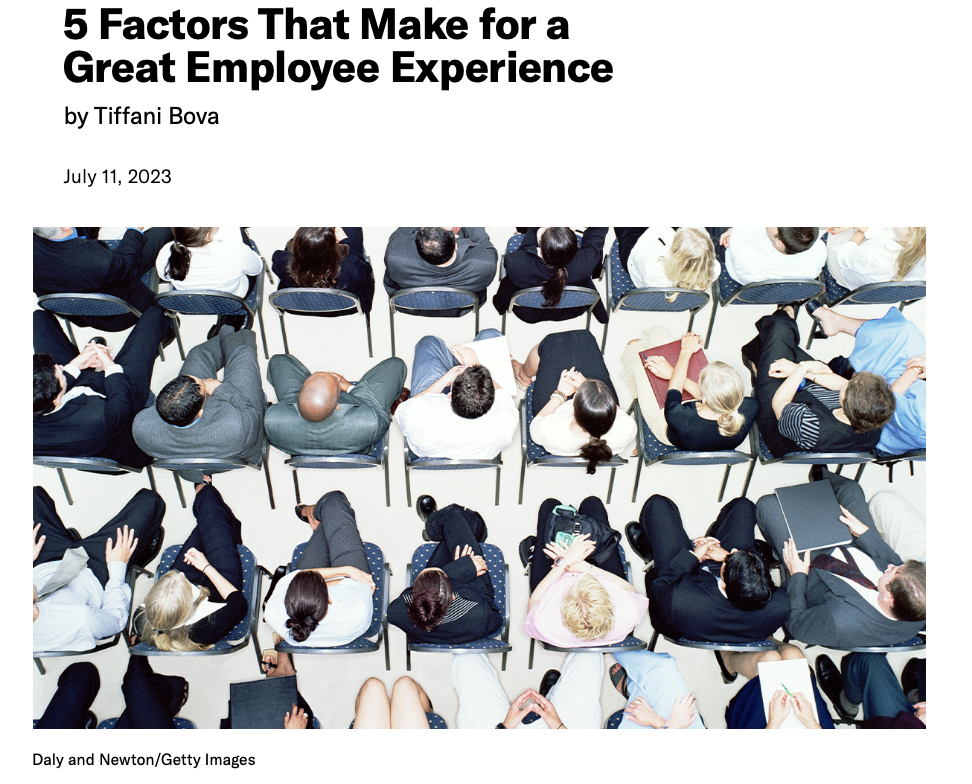훌륭한 직원경험을 만드는 5가지_5 Factors That Make for A Great Employee Experience by Tiffani Bova

수십 년간 비즈니스 전략은 고객 경험을 우선시하여 단기적인 매출 성장을 촉진하는 데 집중해왔다. 그러나 직원보다 고객에 집중하는 것은 장기적인 직원 참여와 유지에 부정적인 영향을 미칠 수 있다. 티파니 보바와 연구팀은 다양한 산업과 지역의 수천 명의 직원과 경영진을 대상으로 연구를 수행해, 우수한 직원 경험을 제공하는 데 중요한 다섯 가지 요소를 확인했다: 상호 신뢰, 최고 경영진의 책임, 직원 가치와 회사 비전의 일치, 성공의 인정, 그리고 원활한 기술 환경이다.
핵심 교훈
고객의 만족도는 중요하지만, 지속 가능한 성장은 직원의 만족도와 참여도에 달려 있다. 직원 경험을 개선하는 것에 집중하면 최대 50%까지 매출 증가를 기대할 수 있다. 이를 위해 기업 리더는 고객 경험과 직원 경험을 균형 있게 관리하고, 둘 다 중요하게 다루어야 한다.
5가지 요소를 세부적으로 살펴보자.
5가지 요소
- 상호 신뢰 Mutual Trust
상호 신뢰는 직원과 조직 간의 신뢰를 의미한다. 이는 직원들에게 자율성을 부여하고, 창의력과 협력을 촉진하며, 높은 직무 만족도를 제공한다. 애플과 리츠칼튼과 같은 기업은 직원들이 독립적으로 문제를 해결할 수 있도록 하여 이러한 신뢰를 보여준다. - 최고 경영진의 책임 C-suite Accountability
최고 경영진은 직원의 요구에 진정성 있게 대응해야 한다. 연구에 따르면 경영진과 직원 간의 피드백 효과에 대한 인식 차이가 큰 것으로 나타났다. 힐튼은 직원 경험을 모니터링하고 개선하기 위해 다양한 부서가 협력하는 구조를 통해 이러한 책임감을 보여준다. - 가치와 비전의 일치 Alignment of Values and Vision
직원들은 자신의 가치와 회사의 미션이 일치할 때 더 큰 몰입감을 느낀다. 이를 위해 회사의 목표와 성과 지표를 명확히 전달해야 한다. 예를 들어, 에어비앤비는 채용 시 '핵심 가치 인터뷰'를 통해 문화적 적합성을 평가하고 있다. - 성공의 인정 Recognition of Success
성과에 대한 인정을 받는 것은 직원 참여와 충성도를 높이는 중요한 방법이다. 유니레버는 개인 맞춤형 개발 계획을 통해 직원들이 회사와 함께 성장할 수 있도록 돕는다.
5. 원활한 기술 환경 Seamless Technology
기술은 업무의 마찰을 줄이고 생산성을 높이는 데 중요한 역할을 한다.
그러나 많은 직원은 회사의 기술이 충분히 통합되지 않았다고 느낀다.
사용자 친화적이고 원활한 기술 제공은 직원 경험 향상에 필수적이다.
2024년 현재 직원 경험을 바라보는 시각
코로나19 팬데믹 이후 원격 근무와 '대퇴직' 등으로 인해 직장 환경은 크게 변화했다. 직원들은 단순한 금전적 보상을 넘어, 업무 환경과의 가치 일치, 기술적 효율성, 그리고 의미 있는 참여를 원하고 있다. 직원 경험은 디지털(DX) 및 자동화(AX) 혁신과 결합되며, 직원들을 단순한 자원이 아닌 핵심 이해 관계자로 인식하는 포괄적 접근이 필요하다.
개인적인 의견
직원 경험은 더 이상 단순히 HR의 관점에서 다뤄져서는 안 된다. 기업의 경쟁력과 브랜드 자산의 핵심 요소로 전환되어야 한다. 사람 중심의 AX와 DX 통합을 통해 더 나은 근무 환경을 조성함으로써, 충성도와 직무 만족도를 높이고 지속 가능한 성공을 이끌어낼 수 있다. 직원 경험을 기업의 전략에 통합함으로써 변화하는 환경에 적응하고, 기술 발전과 함께 인적 가치를 우선시하는 균형 있는 성장을 추구해야 한다.
아티클 소개
티파니 보바가 작성한 이 아티클은 직원 경험의 중요성과 장기적인 조직 성공에 미치는 영향을 조명한다. 보바와 그녀의 연구팀은 전 세계 다양한 산업의 수천 명의 직원과 경영진을 대상으로 설문조사를 통해, 직원 경험을 향상시키기 위한 다섯 가지 핵심 요소를 확인했다. 이 요소는 상호 신뢰, 최고 경영진의 책임, 직원 가치와 회사 비전의 일치, 성공의 인정, 원활한 기술 환경이다. 이 요소들은 직원 참여와 유지율을 높이고, 궁극적으로 회사의 성과를 증진시키는 기반으로 제시된다.
저자 소개
티파니 보바는 세일즈포스의 글로벌 성장 전도사이며, 2021년 Thinkers50 글로벌 경영 사상가 순위에서 상위에 선정된 인물이다. 그녀는 가트너의 연구원 출신으로, Growth IQ와 The Experience Mindset: Changing the Way You Think About Growth의 저자로 월스트리트 저널 베스트셀러 작가이다. 그녀의 연구는 고객 경험과 직원 경험을 결합하여 성장을 촉진하고 조직의 성공을 이끄는 혁신적인 비즈니스 전략에 중점을 두고 있다.
*해당 내용은 2023. July. 11 HBR 아티클을 참고했다.
Executive Summary
For decades, business strategies have emphasized prioritizing customer experience to boost short-term revenue. However, focusing solely on customers at the expense of employees may hinder long-term employee engagement and retention. Tiffani Bova and her team conducted a study involving thousands of employees and executives across various industries and regions. Their research identified five crucial factors that contribute to a superior employee experience: mutual trust, C-suite accountability, alignment between employee values and company vision, recognition of success, and seamless technology integration.
Key Takeaway
While happy customers are essential, sustainable growth depends on the satisfaction and engagement of employees. Companies that focus on enhancing employee experiences can see revenue increases of up to 50%. This shift requires leaders to balance customer and employee experiences, ensuring both are nurtured and valued equally.
5 Factors
- Mutual Trust: Establishing mutual trust involves fostering employees' trust in their organization and vice versa. This trust empowers employees, promotes creativity, and enhances collaboration. Companies like Apple and Ritz-Carlton embody this by allowing staff to make independent decisions to resolve issues, leading to higher job satisfaction and customer service quality.
- C-suite Accountability: This involves top executives demonstrating genuine commitment to their employees' needs. Research showed a significant gap between how executives and employees perceived the effectiveness of feedback actions. Companies like Hilton demonstrate C-suite accountability through cross-functional teams that continuously monitor and improve employee experience.
- Alignment of Values and Vision: Employees feel more engaged when their values align with their company’s mission. Clear communication of corporate goals and milestones fosters this connection. For example, Airbnb ensures alignment through "core values interviews" during the hiring process, ensuring cultural fit and shared passion.
- Recognition of Success: Recognizing achievements can significantly boost engagement and loyalty. At Unilever, personalized development plans help employees feel valued and motivated, leading to increased productivity and morale.
- Seamless Technology: Effective technology reduces workflow friction and enhances productivity. However, many employees find their company's technology insufficiently integrated. Ensuring seamless, user-friendly tech is crucial to improving the employee experience.
The Current Perspective on Employee Experience in 2024
The modern workplace continues to evolve post-pandemic, influenced by shifts such as remote work and the "Great Resignation." Companies have recognized that employees seek more than just financial compensation; they value alignment with their work environment, technological efficiency, and meaningful engagement. The employee experience has become intertwined with digital (DX) and automated (AX) transformations, necessitating a holistic approach that treats workers as essential stakeholders rather than resources.
Personal Opinion
Employee experience should no longer be seen purely through the HR lens. Instead, it must be regarded as a core element of a company’s competitive edge and brand equity. By investing in people-centric strategies that integrate AX and DX, companies can create a more compelling and cohesive work environment. Treating employees not as 'employees' but as 'people' can foster loyalty, enhance job satisfaction, and ultimately contribute to sustained business success. Integrating employee experiences into the broader strategy ensures that businesses can adapt and thrive in dynamic environments, prioritizing human values alongside technological progress.
About Article
This article, written by Tiffani Bova, examines the often-overlooked importance of the employee experience and its impact on long-term organizational success. It highlights a study conducted by Bova and her colleagues that surveyed thousands of employees and executives from various industries worldwide. The article identifies five key factors that are essential for enhancing the employee experience: mutual trust, C-suite accountability, alignment of employee values with company vision, recognition of success, and seamless technology. These factors are presented as foundational for boosting employee engagement, retention, and ultimately, company performance.
Author
Tiffani Bova is the global growth evangelist at Salesforce, recognized as one of the top management thinkers in the 2021 Thinkers50 global ranking. She is a former research fellow at Gartner and a Wall Street Journal bestselling author of Growth IQ and The Experience Mindset: Changing the Way You Think About Growth. Her work focuses on innovative business strategies that combine customer and employee experiences to drive growth and organizational success.
브랜드 경험 인사이트, 놓치지 마세요
매주 발행 · BARAM Framework · 네오 폴리매스 라이프 · AI 시대 브랜딩
무료 구독하기 →
Member discussion